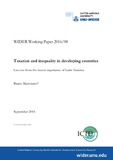| dc.contributor.author | Martorano, Bruno | |
| dc.coverage.spatial | Latin America | |
| dc.date.accessioned | 2017-02-01T14:18:17Z | |
| dc.date.available | 2017-02-01T14:18:17Z | |
| dc.date.issued | 2016 | |
| dc.identifier.citation | Martorano, B. (2016) Taxation and inequality in developing countries - Lessons from the recent experience of Latin America, WIDER Working Paper 2016/98, Helsinki: UNU-WIDER | |
| dc.identifier.uri | https://opendocs.ids.ac.uk/opendocs/handle/20.500.12413/12799 | |
| dc.description.abstract | This paper aims to advance understanding about the relationship between taxation and inequality in developing countries, focusing on the recent experience of Latin America. Although the tax system was regressive in the 1990s, tax changes promoted equality in the first decade of the 2000s. In particular, the increasing contribution of direct taxes with respect to indirect taxes promoted the progressivity of the tax system and contributed to the reduction of inequality. Yet, the effectiveness of taxation in promoting equality in Latin America is still limited by several factors such as the low average tax revenue as percentage of gross domestic product, the relative high contribution of indirect taxes, the inability to tax top incomes, and the low contribution of taxes on property. | |
| dc.language.iso | en | |
| dc.publisher | UNU-WIDER | |
| dc.relation.ispartofseries | WIDER Working Paper 2016/98 | |
| dc.rights.uri | http://www.ids.ac.uk/files/dmfile/IDSOpenDocsStandardTermsOfUse.pdf | |
| dc.subject | Development Policy | |
| dc.subject | Economic Development | |
| dc.subject | Governance | |
| dc.title | Taxation and inequality in developing countries - Lessons from the recent experience of Latin America | |
| dc.type | Series paper (non-IDS) | |
| dc.rights.holder | UNU-WIDER | |
| dc.identifier.team | Governance | |

